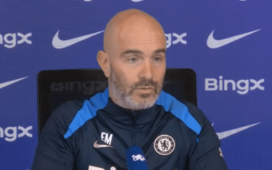England were cloistered in Oxford this week, reflecting on the defeat by Wales in Cardiff last Saturday that ended their tilt at the grand slam. A players’ meeting led by the captain, Owen Farrell, concluded that they failed to adapt during the second half when the home side gnawed away at their lead and, as they had in 2013, made off with the points in the final quarter.
After the victories over Ireland in Dublin and France at Twickenham Eddie Jones put the successes down to the way his players read what was happening and reacted, but the manner of defeat at the Principality Stadium suggested they had been tactical triumphs, the faithful execution of a gameplan that worked. When Wales made their opponents’ line speed an irrelevance by attacking from the fringes of rucks, hurried them into kicks by pressuring their half-backs, kept the ball alive and conceded only three penalties to deny England attacking lineouts, there was no riposte.
“We definitely need to learn how to be adaptable in a game,” said the full-back Elliot Daly at the Oxford camp. “We need to be able to play our own game but have a different tactical plan if it does not go right.”
Against Italy at Twickenham two years ago the Azzurri exploited a loophole in the offside law that left England protesting in vain to the referee but not able to formulate a response until getting into the changing room at half-time. “We did not know that was going to happen but we adapted at half-time and went from there.” That is, they adapted after being shown the way by the coaches rather than problem-solving on the field.
When Warren Gatland remarked after his side’s victory last weekend that England were a side that did not know how to win big matches, the basis of the Wales head coach’s charge was an inability to react to changing circumstances. “We have to realise what is going on in a game and react,” said Daly. “It is a team thing and we are working on it.”
One area where England were superior in Cardiff was the lineout but Wales’s discipline and the visitors’ reluctance to kick the ball to touch meant that did not count for much. England’s one attacking lineout came a minute before the break, when Jonny May chased his kick and bundled Hadleigh Parkes into touch 10 metres from the home tryline. England secured the ball and launched a driving lineout but Alun Wyn Jones disrupted it and Farrell was forced to cross-kick after receiving a poor pass. The chance of a 17-3 interval lead was lost.
The England hooker Jamie George said in Oxford of that missed opportunity: “It was a big moment in the game and as a forward pack we needed to be more clinical. We stressed how important the set pieces were going to be but they did not give us many lineouts, as we knew they would not after Twickenham last year. It was a good learning curve for us.”
England had four lineouts in the match and one fewer put-in to a scrum. Wales had 13 throw-ins and blew three under pressure, including one in their 22. So why did England not kick to touch rather than keep the ball alive and help make the Wales full-back Liam Williams the man of the match? Daly said: “Most of our kicks were outside the 22 and you cannot kick it directly to touch.” So why not bounce it in? “It is difficult for the 9 to do that.” But that’s not the case for the outside backs.

England had a strategy and stuck with it even as it unravelled. They trailed by three points with four minutes to go: a penalty would have given them a draw and put them on course for the title but Wales had conceded only one in the second half. “If you have a massive shift in your reaction you are becoming reactive, not proactive,” said Daly. “We had a plan B: it was just that Wales executed better than us in the second half. Adaptability is a team thing and we are working on it.”
England were as harshly judged after Cardiff as they had been lavishly praised following their victory in Dublin. George said: “I am not surprised at the reaction. It has happened before and will do so again. It is the way it is and everyone is entitled to their opinion.
“The important thing is not to let that affect us physically, mentally or emotionally. We have to stay tight as a group. Owen brought us together after we arrived in Oxford and we have put Cardiff behind us while learning from it.”
George’s front-row colleague Kyle Sinckler was singled out following an all-action display in the first half with three acts of indiscipline after the break before the prop was replaced on 56 minutes. The former England fly-half Andy Goode was among those who felt the forward should bear responsibility for the interval lead turning into a defeat.
George said of Goode, who won 17 caps, five Premiership titles and two Heineken Cups: “It clearly shows he knows nothing about the game. I could not care less what he thinks but I care about Kyle Sinckler. I find it laughable.
“The bloke made however many tackles in 60 minutes but gave away a penalty and everyone thinks it is his fault. He has been great this week and we are ready to start preparing to face Italy.
“This has been the most enjoyable period that I have ever had in an England team. We are creating a very good culture and one loss does not make us the worst team in the world, no matter what some people might say. We want to make sure we show to the English public at Twickenham that we love playing for England. That is important.”
The slam might have disappeared in Cardiff but the title is still a three-way contest, even if Ireland look in need of divine intervention. Italy have improved this year to the extent that their defeats are narrower but their record of never having won at Twickenham does not look in danger.
“They are turning into a serious team,” said George. “We are preparing for a full-on Test match. Whoever we play, the focus is on ourselves.”
Being themselves, at a period in the game of intensive coaching, is another matter.














